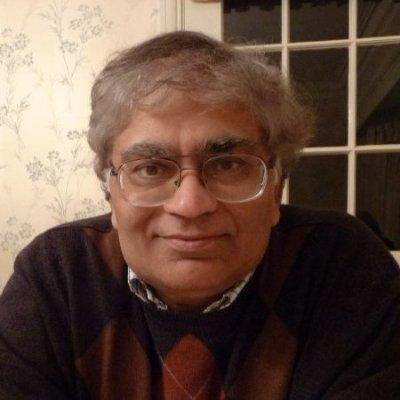Teaching virtual class in Nanjing highlights cultural differences between learning styles in China and U.S. for Professor Pramod Khosla

Teaching across international and cultural barriers can already be an arduous task, and when circumstances force that to be mediated over a virtual exchange rather than in-person, that is only compounded. Fortunately for Professor Pramod Khosla of the Department of Nutrition and Food Science, this is hardly his first time teaching online or with students of varying cultural backgrounds.
In 2020, Khosla received a three-year appointment as a visiting professor in the School of Public Health at Southeastern University in Nanjing, China. The course coordinator in China, Professor Guiju Sun, and Khosla were colleagues on a research advisory panel in Malaysia for five years, and Sun approached Khosla with this course idea. The pre-pandemic plan was for Khosla, who was on sabbatical, to teach a live, two-week workshop in April on disease and nutrition. When that plan was scuttled, the course was redesigned in 2021 as a weekly, synchronous Zoom session from 8 – 11 p.m. Tuesdays in Detroit and 8 – 11 a.m. Wednesdays in China.
This year’s synchronous Zoom course met weekly from 8 – 11 Sunday nights/Monday mornings, from late March to June 7. Khosla hopes to teach the course face to face in 2023 during the final year of his appointment at Southeast.
“Last year we had something like 22 students, and they would meet in the classroom with their laptops and a big screen would display what I was showing them online,” he says. “If you gave me my preference it would always be a live class; I like to walk around and interact. When you’re staring at a screen, you can’t be as expressive.
“However, when it comes to online, smaller classes can be more conducive to learning. It was kept at 21 students, which is good because a small number helps keep the class interactive and the students involved. You can’t keep an eye on 100 students on Zoom.”
Khosla has taught online extensively, conducting workshops and offering lectures via Skype to students training in Bangladesh, so making the switch for this class was not hard. However, there are differences in the learning style of students from southeast Asia and the United States that must be recognized, he says.
“In southeast Asia, a great deal of deference is given to the instructor. Students rarely interrupt or ask questions, so I had to ask questions myself,” Khosla says. “I’m originally from India, but grew up in the UK and I’ve been exposed to different modes of teaching, so I’m familiar with that. In China, in particular, there is a lot more deference to the teacher and that sometimes hinders student progress. I want my students to be able to talk to me as an equal.”
Students in the program at Southeast University are required to complete a class taught by someone whose first language is English. All work for the class – lectures, homework, discussions – is done in English.
“Wherever you go, English is in demand,” say Khosla. “It’s very important they are able to speak it, whatever their field is.”
Khosla says that with his experience from having taught the class last year plus his own teaching experience in southeast Asia, he expects to get the students to open up more.
“Last year it was the first time, so I had to get to know what the students’ language capabilities and learning levels are relative to WSU students. There will now be a lot more interactive elements. I want to get the students involved more. We’ll have group activities to get around the shyness.
“What I want the students to learn, beyond the course material, is that there’s a mode of communication that allows you to exchange your views without being disrespectful.”
By Jacob Stocking, OIP communications associate
The Office of International Programs leads Wayne State's global engagement by creating opportunities that foster international education and research, facilitate the exchange of individuals and ideas that promote global competencies and citizenship, and provide resources that support the expansion of the university's global agenda. Follow us @WayneOIP.